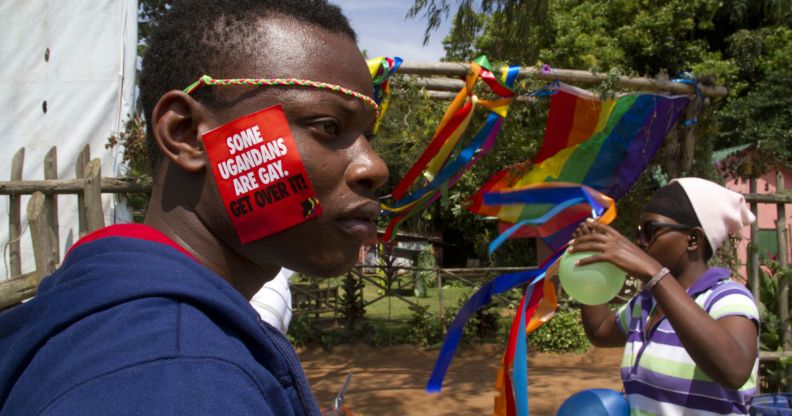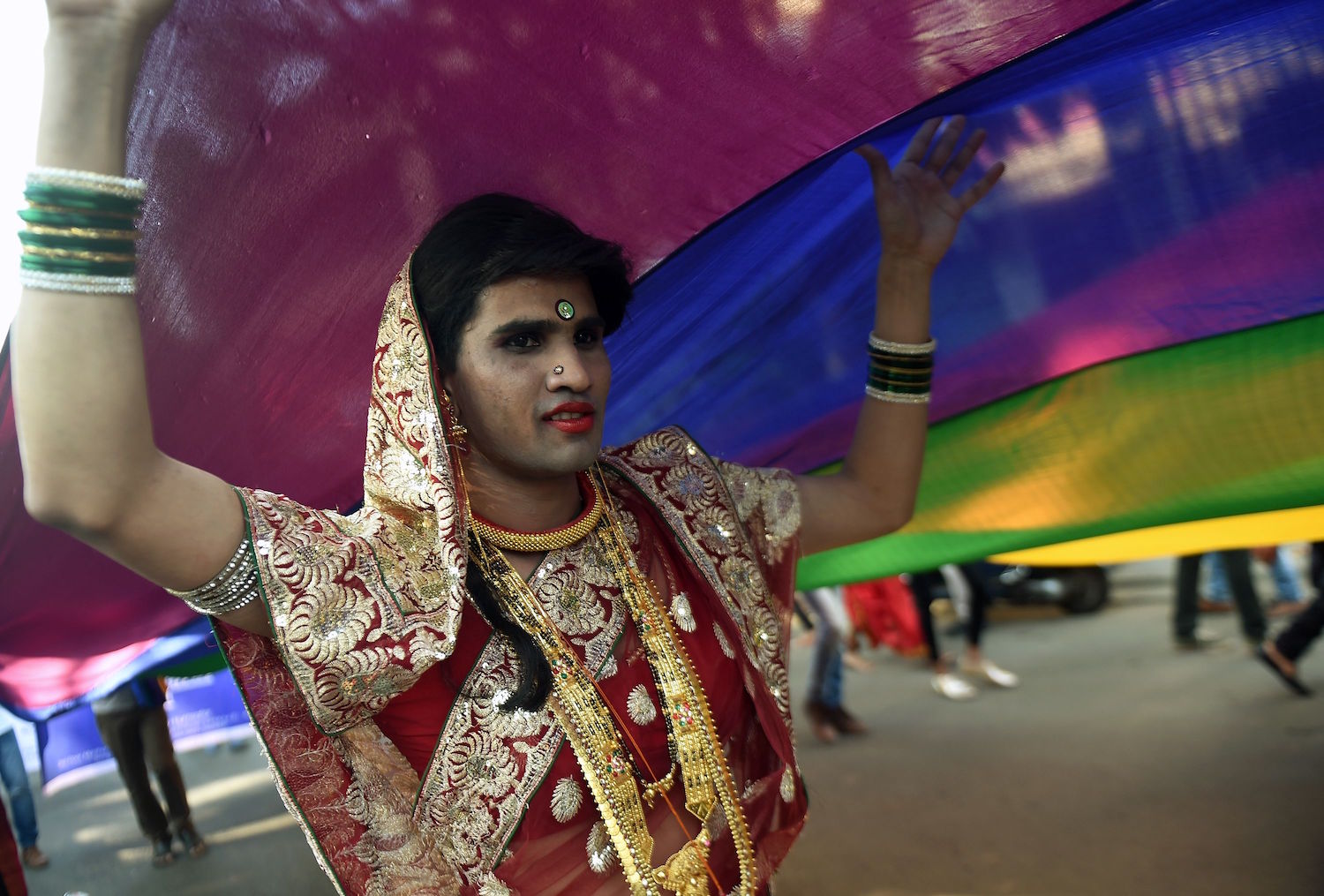What hope does the Commonwealth offer its LGBT citizens?

A Ugandan man with a sticker on his face takes part on August 9, 2014 in the annual gay pride in Entebbe, Uganda. (ISAAC KASAMANI/AFP/Getty Images)
As new research monitoring the progress being made by Commonwealth countries in upholding LGBT rights is released, The Kaleidoscope Trust’s Dr Felicity Daly and Lewis Brooks of the Royal Commonwealth Society ask what hope these countries offer their citizens.
The modern Commonwealth is in many ways a paradox. On the one hand, it is a reminder of the British Empire; yet on the other hand, a network seeking contemporary relevance to uphold universal values of human rights, democracy and equal opportunities for prosperity.

The Commonwealth is primarily a voluntary association of sovereign states, with some commentators supporting its consensus based decision making while others decry its reluctance to sanction serious human rights violators.
It is caught between the human rights agenda being advanced by some member states and allegations of neo-colonialism and the imposition of ‘Western’ values from others.
No issue captures these tensions more so than the struggle for to promote the rights of lesbian, gay, bisexual and trans (LGBT) people in the Commonwealth.
Today, 40 of the 53 Commonwealth member states criminalise sexual activity between consenting same-sex adults and many of these fail to recognise or uphold the rights of trans citizens. The background to this being a ‘Commonwealth problem’ is rooted in the legacy of imperialism.
Laws which are used to persecute LGBT people often are remnants of those imposed by the British colonialists. While criminalising same sex relationships between men were the original target many have since evolved to expand criminalisation to same sex relationships between women and/or increase penalties for offenders.
Thus the legal legacy of Empire feeds contemporary discrimination, persecution and violence based on sexual orientation and gender identity and, in some countries, state repression.
When compared to the aspiration of the Commonwealth Charter, agreed by all 53 members, such abuses are clearly counter to the organisation’s stated values, a point made clear by outgoing Commonwealth Secretary General Kamalesh Sharma.
Can the modern Commonwealth, once remarked by Nelson Mandela as making “the world safe for diversity”, serve to improve the rights of LGBT people?
Posing sanctions and imposed values are antithetical to consensus and unfavourably reminiscent of the colonial enforcement of Victorian British homophobia so we must ensure that the Commonwealth can foster opportunities for cross-cultural dialogue and mutual support for policy progress.

This is most relevant for those activists on the front lines of the struggle for equality around the world. Facing discrimination, persecution and in some cases violence, many LGBT activists from around the Commonwealth have built increasingly resilient bonds of solidarity and are working collectively to convince governments to do more.
Just last year in Malta at the Commonwealth Heads’ of Government Meeting, Barbadian lesbian activist Donnya Piggott, representing The Commonwealth Equality Network (TCEN), became the first person to address Commonwealth Foreign Ministers on LGBT people’s concerns.
She attracted the praise of many Ministers in how she posed the concerns and sought greater understanding and insight into the lived reality of LGBT citizens of the Commonwealth.
Her address and the interventions of other TCEN members during the People’s Forum and Women’s Forum were brilliant examples of the persuasive power of southern LGBT activists leading the conversation with their governments and other Commonwealth stakeholders.
Such activism is resulting in progressive policy. New research launched today by the Royal Commonwealth Society, Kaleidoscope Trust and TCEN demonstrates exactly where in the Commonwealth such progress is emerging.

In 2015, Mozambique repealed the Portuguese colonial-era ban on consensual same sex activity between adults. That same year Kenyan judges asserting that the Kenyan Constitution “includes all persons living within the republic of Kenya despite their sexual orientation” and confers the right to freedom of association ordered the government to register the National Gay and Lesbian Human Rights Commission.
Countries as diverse as Botswana, Seychelles, Samoa and Saint Lucia have included anti-discrimination clauses in employment laws which protect people on the basis of their sexual orientation.
Malta has recently joined Fiji in specifically addressing sexual orientation and gender identity in its constitution, echoing South Africa; the first country in the world to constitutionally protect gay and lesbian citizens.
Supreme Court judgments in India and Pakistan have upheld the rights of ‘third gender’ groups such as Hijras and Kothis.
Meanwhile, LGBT organisations have supported governments to implement LGBT sensitive programmes to police, healthcare professionals and schools across the Caribbean. Southern activists have played a pivotal role in these changes.

While homophobic and transphobic vitriol from some politicians in member states often captures the media’s attention, Commonwealth leaders from Canada’s Prime Minister, Justin Trudeau, to the Prime Minister of St Kitts and Nevis have spoken out against discrimination and in favour of inclusivity.
The architecture of the modern Commonwealth presents an opportunity to capitalise on this progress.
This association of states, intergovernmental institutions and numerous professional networks, collectively creates a variety of mechanisms to promote the rights of LGBT people and opportunities to share promising practice and provide technical expertise to governments seeking to implement changes.
At the centre of this is the new Commonwealth Secretary General, Patricia Scotland who is the first woman to hold the post. She, more than any other, will have to navigate these tensions and paradoxes. However she has indicated that she wants to promote a dialogue.
That dialogue can be meaningfully informed by the evidence in this report makes clear, progress against the colonial legacy and contemporary manifestations of homophobia and transphobia is possible.
A full version of the report can be found here.

